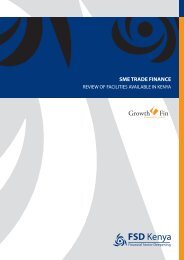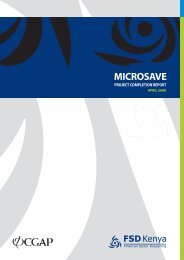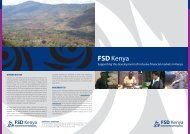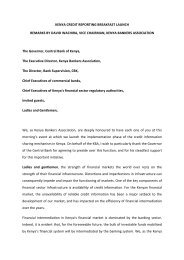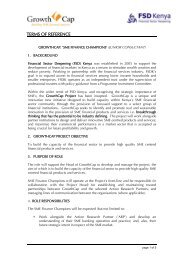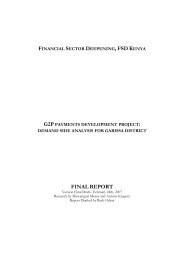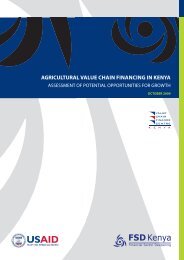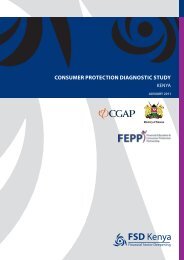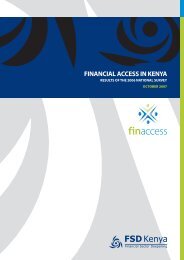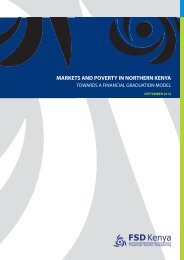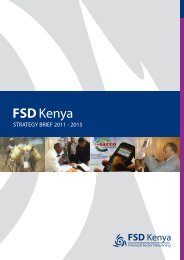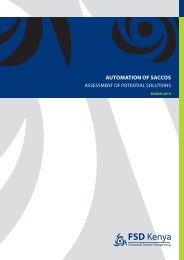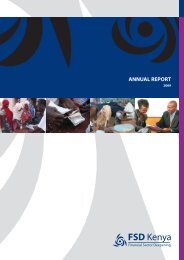fsd's financial education programme: evaluation and ... - FSD Kenya
fsd's financial education programme: evaluation and ... - FSD Kenya
fsd's financial education programme: evaluation and ... - FSD Kenya
You also want an ePaper? Increase the reach of your titles
YUMPU automatically turns print PDFs into web optimized ePapers that Google loves.
24 • <strong>FSD</strong>’S FINANCIAL EDUCATION PROGRAMME: EVALUATION AND RECOMENDATIONS<br />
for which the data may be collected, processed, held, used <strong>and</strong> disclosed<br />
(especially to third parties). The mechanisms should also acknowledge the<br />
rights of consumers to be informed about data-sharing, to access data <strong>and</strong><br />
obtain the prompt correction <strong>and</strong>/ or deletion of inaccurate or unlawfully<br />
collected or processed data.”<br />
9. Complaints h<strong>and</strong>ling <strong>and</strong> redress. “Jurisdictions should ensure that<br />
consumers have access to adequate complaints h<strong>and</strong>ling <strong>and</strong> redress<br />
mechanisms that are accessible, affordable, independent, fair, accountable,<br />
timely <strong>and</strong> efficient. Such mechanisms should not impose unreasonable<br />
cost, delays or burdens on consumers. ….. Financial service providers <strong>and</strong><br />
authorised agents should have in place mechanisms for complaint h<strong>and</strong>ling<br />
<strong>and</strong> redress. Recourse to an independent redress process should be available<br />
to address complaints that are not efficiently resolved via the <strong>financial</strong> service<br />
providers <strong>and</strong> authorised agents’ internal dispute resolution mechanisms.<br />
At a minimum, aggregate information with respect to complaints <strong>and</strong> their<br />
resolution should be made public.”<br />
10. Competition. “Nationally <strong>and</strong> internationally competitive markets<br />
should be promoted in order to provide consumers with greater choice<br />
amongst <strong>financial</strong> services <strong>and</strong> create competitive pressure on providers<br />
to offer competitive products, enhance innovation <strong>and</strong> maintain high<br />
service quality. Consumers should be able to search, compare <strong>and</strong>,<br />
where appropriate, switch between products <strong>and</strong> providers easily <strong>and</strong> at<br />
reasonable <strong>and</strong> disclosed costs.”<br />
Financial <strong>education</strong> <strong>and</strong> capability 5<br />
Financial literacy relates to an individual’s knowledge of <strong>financial</strong> concepts<br />
<strong>and</strong> products. However, knowledge is not sufficient <strong>and</strong> an individual also<br />
needs the required skills to apply this knowledge. Furthermore, an individual’s<br />
value system <strong>and</strong> attitudes impact on how <strong>and</strong> whether knowledge <strong>and</strong> skills<br />
are translated into action (behaviour). So a complicated set of factors are at<br />
play that impact on both an individual’s learning (internalising a message)<br />
<strong>and</strong> his/her behaviour. These include previous learning, personality, cultural<br />
influences, value system <strong>and</strong> current <strong>financial</strong> context. Financial <strong>education</strong><br />
focused on behavioural modification is therefore required to create a positive<br />
pre-disposition among consumers for the message to be ‘heard’ <strong>and</strong> acted<br />
on.<br />
The term <strong>financial</strong> capability is therefore preferred to <strong>financial</strong> literacy<br />
as it better reflects the complementary components of knowledge, skills,<br />
confidence, a positive predisposition <strong>and</strong> ultimately, a change of behaviour.<br />
Financial capability can be defined as: “The ability of an individual to act with<br />
confidence in making the optimal choices in the management of his/her<br />
money matters.”<br />
5 Adapted from: Financial Literacy Framework for Tanzania. 2010. Piprek, Gerda, L. - Marketworx Africa.<br />
Financial <strong>education</strong> is the broad term reflecting all activities aimed at<br />
transferring knowledge <strong>and</strong> skills <strong>and</strong> influencing behaviour. Financial<br />
<strong>education</strong> can take various forms <strong>and</strong> a combination of these <strong>and</strong> different<br />
channels should be included in a consumer strategy, depending on the needs<br />
of the target audience <strong>and</strong> the strategic objectives:<br />
• Awareness of product <strong>and</strong> institutional types, rights <strong>and</strong> responsibilities,<br />
recourse options, changes in the market place <strong>and</strong> where to turn for<br />
advice or assistance when in <strong>financial</strong> distress.<br />
• Broad-based/generic <strong>financial</strong> <strong>education</strong> focused on developing<br />
general <strong>financial</strong> management <strong>and</strong> planning skills such as budgeting,<br />
cash flow management <strong>and</strong> retirement planning. This is required on an<br />
on-going basis throughout an individual’s lifetime.<br />
• Discrete or event-specific <strong>financial</strong> <strong>education</strong> which is product<br />
category specific, such as informing/ educating consumers on how to<br />
purchase a vehicle using hire-purchase or a house through a mortgage<br />
loan. It is generally required on an as needed basis through a person’s life<br />
<strong>and</strong> will change with a person’s life stage.<br />
• Behavioural change: focused on influencing values, beliefs, attitudes<br />
<strong>and</strong> perceptions.<br />
• Financial <strong>and</strong> money advice: this st<strong>and</strong>s somewhat apart from what<br />
is generally termed as <strong>financial</strong> <strong>education</strong>: money advice is provided for<br />
free, but <strong>financial</strong> advice is paid for or tied to a sale. If tied to the sale of<br />
a product, this is generally not viewed as <strong>financial</strong> <strong>education</strong> at all, but<br />
rather sales or marketing.<br />
From the above, it follows that <strong>financial</strong> <strong>education</strong> is not a once-off, but requires<br />
lifelong intervention. The Life Stage Approach 6 to <strong>financial</strong> <strong>education</strong> (Figure<br />
1) was introduced in 2004 7 <strong>and</strong> provides a framework for the development of<br />
a <strong>financial</strong> <strong>education</strong> strategy on a national level. It takes into consideration<br />
the life cycle of consumers <strong>and</strong> underscores the importance of early learning.<br />
Relevance of <strong>financial</strong> capability <strong>and</strong> relationship to consumer<br />
protection<br />
The attention of governments <strong>and</strong> practitioners in the development <strong>and</strong><br />
support of <strong>financial</strong> sectors has historically been focused primarily on the<br />
enabling environment (legal, regulatory <strong>and</strong> policy) <strong>and</strong> on the supply side.<br />
Only in the past decade has the importance of <strong>financial</strong> capability among<br />
consumers been recognised.<br />
6 Adapted from: Financial Literacy Scoping Study <strong>and</strong> Strategy Study FinMark Trust 2004, page 42.<br />
Piprek, G.L., Coetzee, G., Dlamini, P. – ECIAfrica.<br />
7 Ibid.



